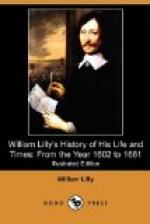After the fight, Manchester marched slowly southward, &c. but at last came with his army to Newbury fight; which ended, he came for London, and there he accuseth Cromwell, being his Lieutenant, to the Parliament, of disobedience, and not obeying his orders.
The House of Commons acquaint Cromwell herewith, and charge him, as he would answer it before God, that the day following he should give them a full account of Manchester’s proceedings, and the cause and occasion of their difference, and of the reasons why Manchester did not timely move westward for the relief of Essex, then in the west, who was absolutely routed, inforced to fly, all his foot taken, and all his ordnance and train of artillery, only the horse escaping. Cromwell the next day gave this account to Mr. Speaker in the House of Commons—by way of recrimination.
That after God had given them a successful victory at Marston over the King’s forces, and that they had well refreshed their army, Manchester, by their order, did move southward, but with such slowness, that sometimes he would not march for three days together; sometimes he would lie still one day, then two days; whereupon he said, considering the Earl of Essex was in the west, with what success he then knew not, he moved Manchester several times to quicken his march to the west, for relief of Essex, if he were beaten, or to divert the King’s forces from following of Essex; but he said Manchester still refused to make any haste; and that one day he said, ’If any man but yourself, Lieutenant, should so frequently trouble me, I would call him before a Council of War. We have beaten the King’s forces in the north; if we should do so in the west, his Majesty is then undone: he hath many sons living; if any of them come to the Crown, as they well may, they will never forget us.’ This Major Hammond, a man of honour, will justify as well as myself. After which he marched not at all, until he had order from the Committee to hasten westward, by reason of Essex’s being lost in Cornwall, which then he did; and at Newbury fight, it is true, I refused to obey his directions and order: for this it was; his Majesty’s horse being betwixt four and five thousand in a large common, in good order, he commands me, Mr. Speaker, to charge them; we having no way to come at them but through a narrow lane, where not above three horse could march abreast; whereby had I followed his order, we had been all cut off ere we could have got into any order. Mr. Speaker, (and then he wept; which he could do toties quoties) I, considering that all the visible army you then had, was by this counsel in danger to be lost, refused thus to endanger the main strength, which now most of all consisted of those horse under my command, &c.—This his recrimination was well accepted by the House of Commons, who thereupon, and from that time, thought there was none of the House of Lords very fit to be entrusted with their future armies, but had then thoughts of making a commoner their General; which afterwards they did, and elected Sir Thomas Fairfax their General, and Cromwell Lieutenant-General; but it was next spring first. Upon Essex’s being lost in Cornwall, I heard Serjeant Maynard say, ’If now the King haste to London we are undone, having no army to resist him.’




